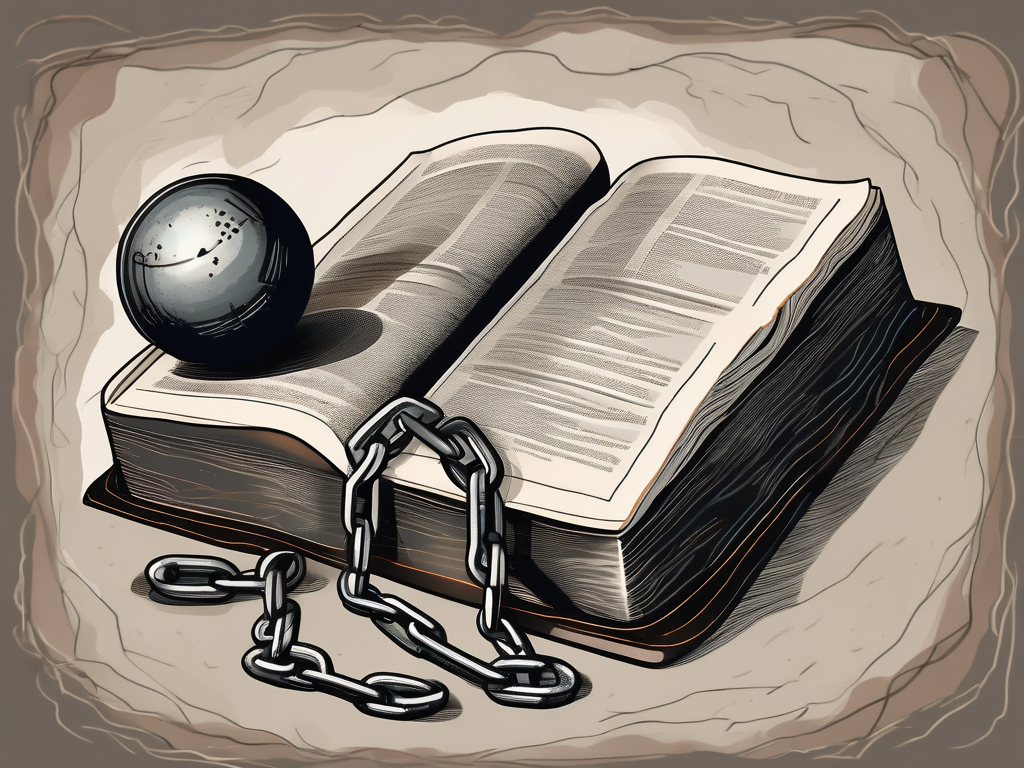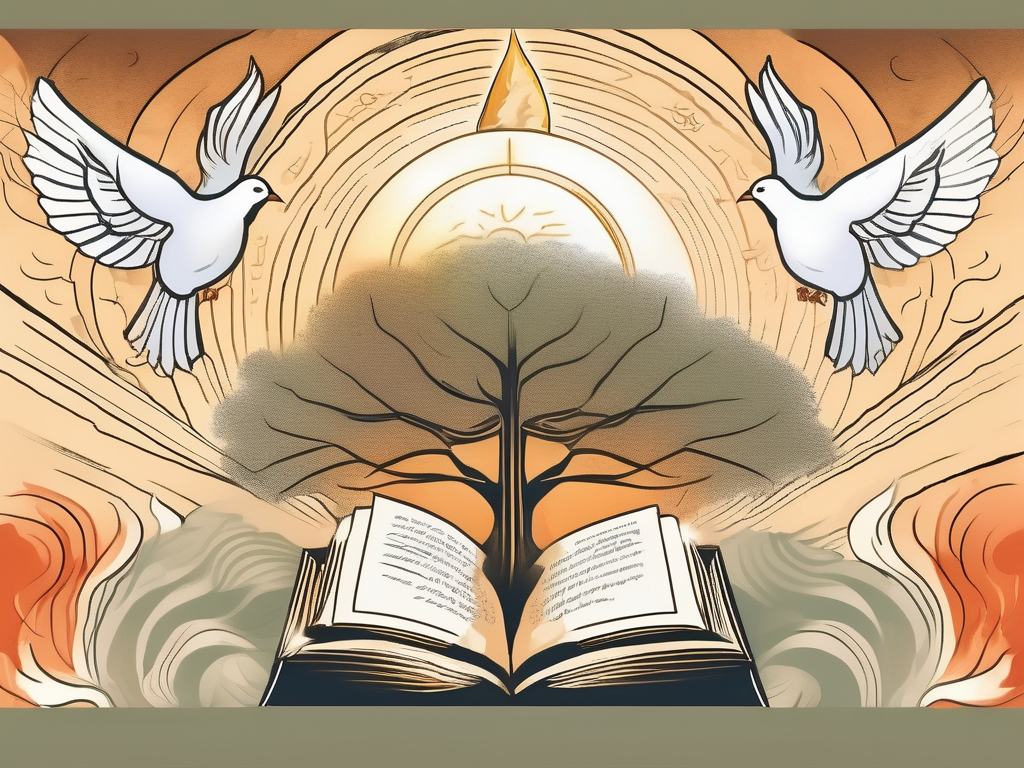In Judaism, Moses is a figure of great importance and significance. He played a pivotal role in the history and belief system of the Jewish people. Understanding the role of Moses in Judaism requires delving into various aspects of his life and teachings. Let’s explore his prophetic leadership, his teachings, and his connection to the Ten Commandments.
Understanding the Role of Moses in Judaism
Moses: The Prophet and Leader
Moses is widely regarded as one of the most prominent prophets in Judaism. He was chosen by God to be the leader of the Israelites, guiding them out of slavery in Egypt and towards the Promised Land. His profound connection with the Divine allowed him to receive messages and commandments directly from God.
As the leader of the Israelites, Moses faced numerous challenges and obstacles. He had to navigate the treacherous terrain of the desert, ensuring the safety and well-being of the people under his care. Moses’ leadership qualities were evident in his ability to make difficult decisions, such as when he parted the Red Sea to allow the Israelites to escape the pursuing Egyptian army.
Furthermore, Moses served as a mediator between God and the Israelites. He would often intercede on behalf of the people, pleading for God’s mercy and forgiveness. This role as an intermediary highlighted Moses’ deep understanding of the human condition and his unwavering commitment to the well-being of his people.
The Teachings of Moses
Moses not only led the Israelites, but he also imparted invaluable teachings to them. His teachings, which encompass various aspects of morality, ethics, and social justice, form a cornerstone of Jewish belief and practice. Through his words, Moses aimed to instill a sense of righteousness and adherence to God’s commandments among the Jewish people.
One of the fundamental teachings of Moses was the importance of justice and fairness. He emphasized the need for equitable treatment of all individuals, regardless of their social status or background. Moses believed that society should be built on principles of compassion, empathy, and respect for one another.
In addition to his teachings on justice, Moses also emphasized the significance of gratitude and humility. He encouraged the Israelites to express gratitude to God for the blessings they received and to remain humble in their achievements. Moses believed that true greatness came from recognizing one’s limitations and acknowledging the role of a higher power in guiding their lives.
Moses and the Ten Commandments
One of the most significant moments in Moses’ life is undoubtedly his encounter with God on Mount Sinai, where he received the Ten Commandments. These commandments, given to Moses as a moral and ethical compass for the Israelites, have since become essential principles in Judaism. They define the relationship between God and humanity, as well as the responsibilities individuals have towards each other.
The Ten Commandments encompass a wide range of ethical and moral obligations. They include commandments such as honoring one’s parents, refraining from murder and theft, and avoiding false witness. These commandments serve as a guide for individuals to lead a righteous and virtuous life, promoting harmony and justice within society.
Moses played a crucial role in not only receiving the Ten Commandments but also in transmitting them to the Israelites. He ensured that these commandments were understood and followed by the people, reinforcing their importance through his teachings and actions. Moses’ commitment to upholding the commandments set a precedent for future generations, solidifying their significance in Jewish religious and ethical practices.
The Life of Moses: A Chronological Overview
Moses’ life began in the challenging circumstances of ancient Egypt. Born to Hebrew parents, he was sent down the Nile in a basket to escape Pharaoh’s decree to kill all Hebrew baby boys. Miraculously, he was found by Pharaoh’s daughter, who raised him as her own. This unique upbringing exposed him to the customs and traditions of ancient Egypt.
As Moses grew older, he became aware of his Hebrew heritage and felt a deep connection to his people. Despite being raised in the opulence of Pharaoh’s palace, he couldn’t ignore the suffering of his fellow Hebrews who were enslaved by the Egyptians. This internal conflict would shape the course of his life and lead him on a remarkable journey.
Moses and the Burning Bush
It was during Moses’ adult years that his life took a momentous turn. While tending to his flock, he encountered a burning bush that was not consumed by the flames. God spoke to him from within the bush, revealing His plan for Moses to lead the Israelites out of slavery. This encounter marked the beginning of Moses’ journey as a prophet and leader.
The burning bush incident was a pivotal moment for Moses. It was a divine calling that ignited a fire within him to fulfill his purpose. With a newfound sense of purpose and determination, Moses returned to Egypt to confront Pharaoh and demand the release of the Israelites. This would be the start of a series of confrontations and plagues that would ultimately lead to the liberation of his people.
The Exodus and Journey Through the Wilderness
Under the guidance of Moses, the Israelites embarked on a liberating journey from Egypt known as the Exodus. Crossing the Red Sea and enduring numerous challenges in the wilderness, they forged their way towards the land promised to them by God. These formative experiences and trials shaped the Israelites as a nation and solidified Moses’ role as their leader.
The Exodus was not an easy journey. The Israelites faced hunger, thirst, and constant uncertainty as they navigated through the harsh wilderness. Moses, with unwavering faith and trust in God, led them through these trials, providing them with guidance and hope. He became not only their leader but also their source of inspiration and strength.
Throughout their journey, Moses received divine guidance and commandments from God, including the Ten Commandments, which would serve as the foundation of the Israelite’s moral and spiritual code. These commandments would shape their society and provide them with a framework for living a righteous life.
As the Israelites continued their journey, Moses faced numerous challenges, including dealing with internal conflicts and rebellions within the community. Despite these difficulties, Moses remained steadfast in his commitment to leading his people to the Promised Land.
The life of Moses is a testament to the power of faith, resilience, and leadership. From his humble beginnings as an abandoned baby to becoming the liberator of the Israelites, Moses’ life is an extraordinary tale of courage and devotion. His story continues to inspire and teach valuable lessons to people of all generations.
The Legacy of Moses in Judaism
Moses, a towering figure in Jewish history, left an indelible mark on the religion and its followers. His influence extends far beyond the historical accounts of his life and accomplishments. Moses’ teachings, experiences, and profound connection with God have inspired a vast body of Jewish literature and thought, shaping the faith for generations to come.
Moses in Jewish Literature and Thought
The impact of Moses’ life and teachings can be seen in the rich tapestry of Jewish literature and thought. The Torah, the sacred text of Judaism, serves as the foundation for Jewish beliefs and practices. Within its pages, Moses’ encounters with God, his leadership of the Israelites, and his delivery of the commandments are chronicled. But the legacy of Moses does not end there.
Throughout the centuries, Jewish scholars and thinkers have delved into the depths of Moses’ story, seeking to understand its significance and draw lessons for contemporary life. Commentaries, stories, and interpretations have emerged, each offering unique perspectives on the life and teachings of Moses. These writings not only provide insights into the historical context of Moses’ time but also offer guidance and inspiration for navigating the complexities of the modern world.
The Influence of Moses on Jewish Laws and Customs
Moses’ impact on Judaism extends beyond philosophical musings and literary works. His teachings and the commandments he received from God have shaped the very fabric of Jewish laws and customs. The instructions Moses delivered to the Israelites serve as the foundation for Jewish legal principles and rituals that are still observed today.
One of the most significant areas where Moses’ influence is evident is in the observance of the Sabbath. As commanded by Moses, Jews set aside the seventh day of the week as a day of rest and reflection. This practice, rooted in the belief that God rested on the seventh day after creating the world, has become a cornerstone of Jewish identity and a time for communal worship and family bonding.
In addition to the Sabbath, Moses’ teachings have also shaped Jewish dietary laws, known as kashrut. These laws dictate what foods are considered kosher, or ritually pure, and how they should be prepared and consumed. The meticulous attention to detail in food preparation and the separation of meat and dairy products can be traced back to the commandments Moses received on Mount Sinai.
Furthermore, Moses’ influence permeates every aspect of Jewish life, from marriage and family dynamics to social justice and ethical conduct. His emphasis on justice, fairness, and compassion has guided Jewish communities throughout history, inspiring them to strive for a more just and equitable society.
In conclusion, Moses’ legacy in Judaism is a testament to his profound impact on the faith and its followers. Through the vast body of Jewish literature and thought, his teachings continue to inspire and guide generations of believers. From the observance of the Sabbath to the adherence to dietary laws, Moses’ influence is woven into the very fabric of Jewish laws and customs. His legacy serves as a constant reminder of the enduring power of faith and the transformative potential of a life dedicated to serving God and humanity.
Debates and Controversies Surrounding Moses
The Historicity of Moses
While Moses occupies a central position in Jewish tradition, some scholars have debated the historicity of his existence. Archaeological evidence concerning his life and the events described in the Torah has been a subject of ongoing discussion. Nevertheless, for believers, the enduring symbolism and spiritual impact of Moses overshadow any historical uncertainties.
Moses and the Concept of Monotheism
Moses is often credited with introducing the concept of monotheism to the Israelites. His teachings emphasized the worship of one God, Yahweh. This shift from polytheism to monotheism played a crucial role in the development of Jewish religious beliefs and had a profound impact on the history of monotheistic religions as a whole.
Conclusion: The Enduring Significance of Moses in Judaism
Moses remains a towering figure in Judaism, revered for his prophetic leadership, teachings, and the reception of the Ten Commandments. His life and experiences have left an indelible mark on Jewish literature, laws, and customs. Regardless of historical debates, the enduring significance of Moses lies in his legacy as the chosen leader who guided the Israelites to freedom and established a profound relationship between God and the Jewish people.












